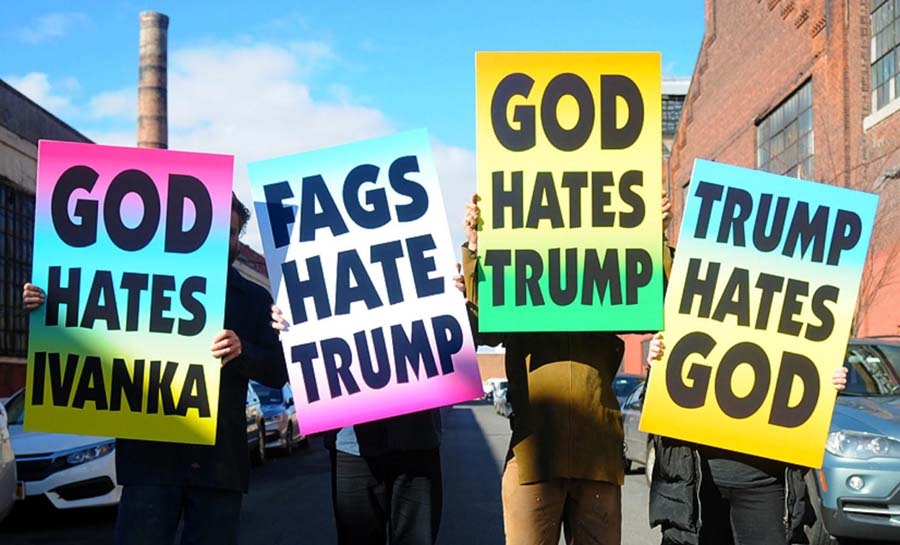Only a few days after they had been published to support the women’s march day, artist Paul Chan’s publishing house Badlands Unlimited found that their anti-Trump protest posters had been pulled from Facebook and Instagram. The four posters aren’t exactly polite: ‘GOD HATES TRUMP’ reads one, along with ‘FAGS HATE TRUMP’, ‘TRUMP HATES GOD’, and, not forgetting everyone’s most-loathed art collector, ‘GOD HATES IVANKA’.
Designing protest posters has become a raucous aspect of artists’ involvement in an increasingly polarised political culture, with everyone from Wolfgang Tillmans to Shepard Fairey using the power of social media and cheap printing to get their message out. And the Badlands posters are particularly in-you-face examples of the new protest poster. The designs are, to an extent, ironic, since they mimic the infamous ‘GOD HATES FAGS’ posters put out by campaigners of the Christian fundamentalist Westboro Baptist Church, in Kansas, known for their picketing of funerals, gay rallies and other public events.
The trouble is that Facebook, and the Facebook-owned Instagram, don’t really get the idea of irony. Last Friday, Facebook sent a notice to Badlands stating the images did not meet ‘community standards’ and were being removed. On Saturday afternoon, Instagram sent a notice stating a similar offense: the images do not ‘follow community guidelines’.
In response to the removal of the images, Badlands protests that:
‘…the legal threshold for what constitutes “community standards” are too low and vague, and intentionally so. The pretense of protecting a community is what typically justifies the stifling of dissent and other forms of “other-mindedness” in images and texts. It is Badlands’s opinion that the Trump administration represents a clear and present danger to Christian, Jewish, Muslim, secular, straight, LGBTQ, and other community standards everywhere in the US.’
Is declaring that ‘FAGS HATE TRUMP’ itself hate-speech? And would supporters of Donald Trump feel ‘unsafe’?
Whatever you think about the posters, Facebook and Instagram’s response is no doubt censorship. But the trouble with Badlands’ position is that in arguing over whether Facebook and Instagram are being disingenuous in invoking ‘community standards’, it doesn’t challenge the logic of those standards. Facebook’s community standards are about making sure that ‘people feel safe’ when on their platforms. And when one gets down to the section on hate speech, it’s clear that Facebook bends over backwards to ban speech which attacks people for their ‘race, ethnicity, national origin, religious affiliation, sexual orientation, sex, gender or gender identity, or serious disabilities or diseases’. What Facebook is more coy about is what discretion it exercises beyond that – is declaring that ‘FAGS HATE TRUMP’ itself hate-speech? And would supporters of Donald Trump feel ‘unsafe’?
Whether someone else ‘feels safe’, is a pretty loose, catch-all criterion for curtailing free speech. Unfortunately, from ‘safe spaces’ on campus to ‘trigger warnings’ to the discourse around ‘microagressions’, it’s often been liberal and left-winger campaigners who have called for the speech of others to be suppressed. And social media platforms have become quick to intervene in excluding offensive speech and speakers from their platforms, regardless of their political persuasion (in the name of impartiality, of course). For example, the banning by Twitter of obnoxious alt-right comment-imbecile Milo Yiannopoulos last summer, allegedly for directing his followers to insult and harass actress Lesley Jones, quickly turned him into a free speech martyr. Now, Yiannopoulos is touring US college campuses, with protesters at his events often forcing the cancellation of his talks. Is that legitimate protest, harassment or censorship?
Unfortunately, opportunist demagogues like Milo often get to claim the torch of free speech, and, paradoxically, get to play the victim. The trouble is the logic and language of ‘feeling safe’, of not being victimised, means that anyone’s free speech quickly becomes someone else’s hate speech. Maybe Badlands’ anti-Trump posters are hateful. But maybe free speech isn’t always pleasant, polite, innocuous, innocent or unthreatening. And that means that defending one’s own freedom of speech means defending it for others, however disagreeable. But it also means that ‘feeling safe’ can’t be the ‘trump’-card to play against others, since that card will, sooner or later, be played against you.
27 January 2017
